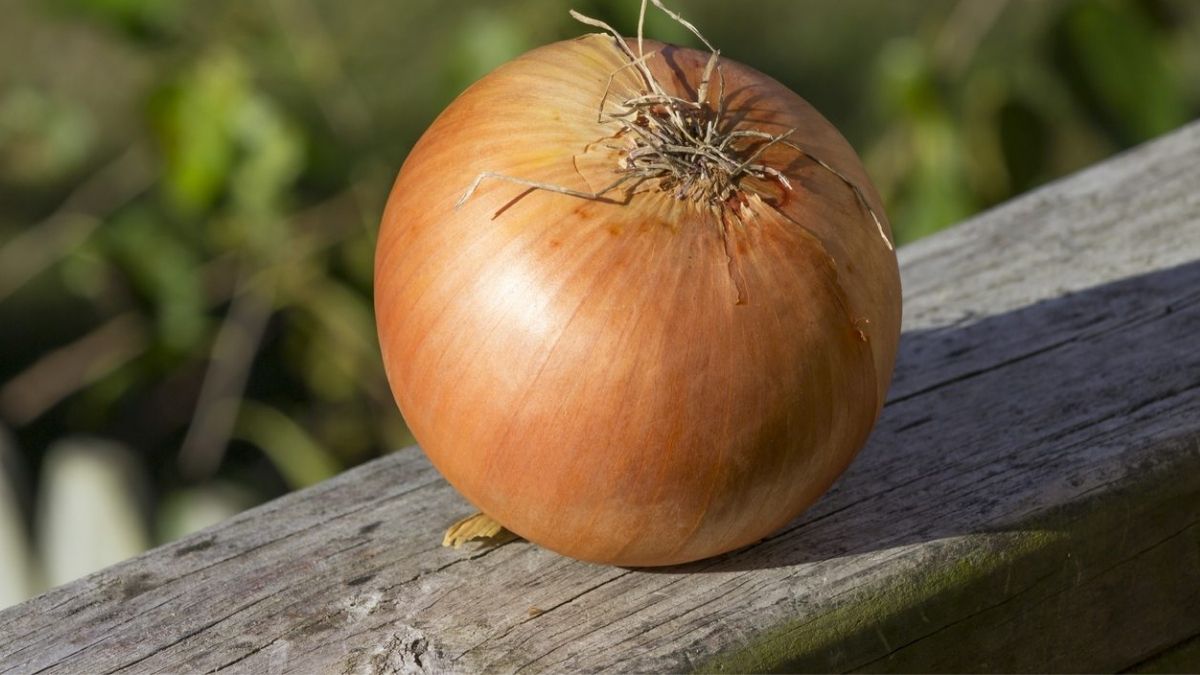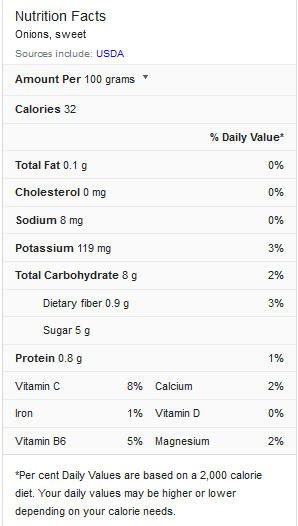Sweet onions are aromatic root vegetables available in various varieties with a flavor characteristic of garlic or chives. They are high in vitamin C, chromium, folate, and fiber, which are nutrients that many people do not get enough of regularly. The sweet onion is less acidic than its relatives, which results in a mild and sweet flavor. Due to its milder flavor, the sweet onion is an excellent nutrient-dense vegetable to include in the diets of both adults and children.
Sweet onions—including Maui Sweets, Vidalia Sweets, Texas Sweet, and Walla Walla Sweets—lack the sulfuric punch of regular onions. They won’t make you weep when you cut them! While this is acceptable in some meals, it can sometimes result in flat, boring outcomes. Cooking them in the same manner as other onions is a waste of the distinctively vibrant flavor that sweet onions offer to the table. Sweet onions’ mild flavor makes them ideal for use fresh in salads and relishes or sliced as a garnish.
Sweet Onion Nutrition Facts
What Other Name Would You Give A Sweet Onion?
A Vidalia onion is a sweet onion variety. It has a moderate flavor, an unusually flat shape, and a relatively high sugar level. Vidalia, Georgia’s soil contains an insufficient quantity of sulfur, contributing to this variety’s sweetness rather than sharpness. It lacks the strong, extremely acidic flavor associated with other onions. Sweet onion is a type of onion that does not have a strong flavor, and their mild flavor is because they contain less sulfur and more water than other onion kinds.
What Gives Sweet Onions Their Sweet Taste?
Sweet onions do not always contain more sugar than ordinary onions (although some do).
Sweet onions taste sweet because they have less sulfur and hence less pungency than regular onions, allowing you to enjoy all of the sugar found naturally in onions (the sugar that gets coaxed out as you simmer them into caramelized onions, for example). It is not always more sugar. However, some sweet onions do contain a significant amount of sugar. The primary reason sweet onions taste sweeter than other onions is that they have fewer sulfur compounds, particularly pyruvic acid, which imparts pungency to normal, or storage onions.
How To Use Sweet Onions?
Because sweet onions lack the strong flavor of ordinary onions, they are not recommended for use as aromatics in recipes in place of regular onions. If you do, the resulting dish will be devoid of the underlying punch of flavor that onions often bring. While this is acceptable in some meals, it can sometimes result in flat, boring outcomes.
Cooking them in the same manner as other onions is a waste of the distinctively vibrant flavor that sweet onions offer to the table. Sweet onions’ mild flavor makes them ideal for use fresh in salads and relishes or sliced as a garnish. Are you interested in cooking them? Sweet onions are particularly delicious when made into onion rings or just roasted.
How To Include Sweet Onions Into Your Diet In A Simple Way?
Here are some of our favorite quick tips:
- Coat sweet onion slices in whole-wheat breadcrumbs and spices and bake for a healthier alternative to onion rings.
- In a skillet, caramelize sweet onions. After the caramelized onions have cooled, combine them with Greek yogurt, garlic, thyme, pepper, and salt to make a creamy French onion dip.
- Prepare a quick and easy dinner by sautéing thick slices of delicious onions with peppers, potatoes, turkey or chicken sausage, and spices.
- Sweet onions, tomatoes, garlic, olive oil, oregano, and salt are cooked down to create a flexible red sauce that may be used to top pizza, pasta, meats, or sandwiches.
- To add sweetness to a quesadilla lunch, layer caramelized sweet onions between tortillas and your preferred cheese, veggies, and beans or chicken.
- Onions are packed with vitamins, minerals, and phytochemicals that work in unison to keep our systems functioning optimally. Whether sautéing, grilling, or simply chopping onions for your next meal, this essential vegetable has numerous health benefits for the entire family!
How To Store Sweet Onions?
At room temperature, sweet onions in good condition will keep for a week or two. Please keep them in an open paper bag in a cool, dark area for more extended storage. You can store them in a paper bag or on layers of newspaper in the crisper drawer. Never wrap them in plastic due to their juicy nature, making them prone to rot and mold.
- The most straightforward approach to preserving sweet onions and avoiding bruising is to keep them in an excellent, dry location that is kept separate from other produce.
- Always exercise caution when handling sweet onions. And they bruise readily due to their higher sugar and water content.
Separately wrap sweet onions in paper towels or newspaper and refrigerate. - You can store sweet onions in clean, sheer pantyhose legs by tying a knot between each onion and hanging the hose in a cool, dry, well-ventilated room. To utilize an onion, cut above the knot.
- Arrange sweet onions on raised racks or screens in an excellent location. Ensuring they do not touch.
- Sweet onions should be chopped and dried in the oven on the lowest heat. Remove after completely dry but not yet brown. Store in sealed containers at room temperature.
- Cut them and set them on a cookie sheet to freeze sweet onions. Place the chopped onions in freezer containers or bags once frozen.
- Peel, wash, and core whole sweet onions before placing them in a freezer bag. Because freezing alters the texture of the onion, frozen Vidalias should be used exclusively for cooking.
What Are The Health Benefits Of Sweet Onion?
- Boosts Immune Systems
Onions are a powerhouse of antioxidants! Vitamin C aids the immune system by reducing inflammation and neutralizing free radicals that might impair immunological function. Onions are also a good source of quercetin, a potent antiviral that aids the body in utilizing zinc to combat viral replication, such as the flu and COVID-19. Consuming immune-boosting foods is especially critical for children, whose immune systems are still growing. Visit our Recipes section for a variety of kid-friendly sweet onion recipes!
- Improves Gut Health and Digestion
Due to the gut-brain connection, stress or anxiety can hurt your GI system and digestion. Therefore, we must consume nutrients that support gut health and digestion. Raw and cooked onions are both prebiotic fibers, which means they can feed and nourish the live probiotic bacteria that help keep your gut and stomach healthy.
- Maintains Strong Bones
Onions have been proved in research to help maintain strong bones. This root vegetable’s high vitamin C content aids in calcium absorption – a mineral necessary for bone mass growth.
- Regulates Blood Sugar
Onions contain chromium, which can modulate blood sugar levels. This allows children to maintain their energy levels while playing and helps prevent mid-afternoon crashes.
- Reduces Inflammation
Onions contain chromium, which has been shown to help control blood sugar levels. This enables children to maintain a healthy level of energy while playing, so avoiding mid-afternoon crashes.
Conclusion
Sweet onions have thinner skins, are juicier, and do not store as well as regular onions. Select sweet onions that feel weighty for their size and are free of bruises or blemishes to ensure maximum shelf life. Sweet onions are aromatic root vegetables available in various varieties with a flavor characteristic of garlic or chives. They are high in vitamin C, chromium, folate, and fiber, which are nutrients that many people do not get enough of regularly. In a pot, place the onions and a dampened cartouche on the surface in contact with the onions. Cover tightly with a lid and place over low heat to enable the onions to sweat. 2 Occasionally check the onions, especially if a lot of steam is escaping.


